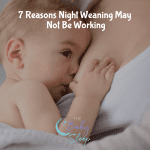
If you’re considering weaning your baby, you’re probably thinking about which weaning method you’ll use. Or, you might be considering which bottle or cup will make the transition easiest. And, if you’re reading The Baby Sleep Site®, you are probably also thinking about how this may impact your baby’s sleep!
Simply put, weaning (whether you’re weaning from breastfeeding to a bottle, night weaning, or weaning from formula/breastmilk to milk from a cup) can cause an otherwise great sleeper to wake and fuss more often, and if your baby already struggles with sleep, weaning can make your nights even more sleepless. On the other hand, if your baby is breastfeeding to sleep, weaning can improve sleep, in some cases.
Why Will Weaning Impact My Baby’s Sleep?
The reason weaning can have a major impact on sleep is that weaning is about more than simply exchanging one food source for another. For our babies, the end of breastfeeding can be an emotional, difficult experience.
How Will Weaning Impact My Baby’s Sleep?
If you are weaning from the breast to a bottle or to a cup…..
…then weaning means the end of prolonged skin-to-skin contact between mom and baby. Remember that breastfeeding is more than just feeding time; it has comforting associations for baby. Some babies even end up using mom as a “human pacifier”! For these reasons, weaning can make your baby much fussier than normal, which can lead to interrupted naps and lots of nighttime waking.
….then it isn’t just baby’s sleep that may be disrupted during the weaning process — mom’s may be, too! Weaning can lead to engorgement and possible infection, called mastitis. This is especially true for moms who try to wean their babies quickly, cutting out multiple feedings at once.
….it may take a little time for your baby’s appetite to adjust. This can be another reason for sudden nighttime waking and sleeplessness — your baby’s appetite is adjusting to this new kind of nourishment. This adjustment can take 1-2 weeks. You can help your baby during this time by making sure you’re offering enough nourishment during the day. But, remember that breast milk and formula should be your baby’s primary nutrition during the first year, so do not overcompensate with solids, if it’s not time. Check with your doctor on adequate amounts of formula for your baby’s age.
If you are night weaning…
…. weaning can also disturb your baby’s sleep if you’ve made a habit of feeding your little one to sleep each night. If that’s the case, then nursing or bottle feeding has likely become a sleep association for your baby. Therefore, when you change that feeding, you’re changing the thing he needs to fall asleep. This can make bedtime an exhausting battle each night.
…..keep in mind that night weaning can also impact naps. If your baby isn’t sleeping well at night while you wean, it can lead to overtiredness, which will impact naps while you night wean. In addition, if you are night weaning AND trying to wean your baby from the breast or bottle to a cup, your baby may start to resist naps if a breastfeed or bottle was part of your pre-nap routine.
…your baby’s sleep will be impacted if the weaning was “mom-initiated” instead of “baby-initiated.” Generally, at some point between 1 and 2 years of age, a baby will show signs of self-weaning. Baby-led weaning like this is usually easier and takes less time. Of course, baby-initiated weaning isn’t always possible; sometimes weaning has to happen earlier! If you’re weaning your baby before the one-year mark, it’s important to remember that the process may take longer. And your baby’s sleep may be disrupted.
(Tip: If you’re working on night weaning, you’ll benefit greatly from our step-by-step VIP Members Area article, How Fixed and Fluid Schedules Can Help You Night Wean.)
How Can I Help My Baby Sleep Well During the Weaning Process?
Avoid a “cold turkey” approach (in which you abruptly stop nursing or bottle feeding). This can be very upsetting for your baby, and, as mentioned earlier, it’s likely to cause complications for you. Instead, opt for a gentler, “slow and steady” approach; it’ll be far less disruptive to your baby’s sleep. A “slow and steady” approach would look something like this:
- At feeding time, nurse or bottle feed your baby as you normally would. Then, offer your baby a bottle of formula (if weaning from the breast) or a cup (if weaning from breast or bottle entirely).
- When your baby has gotten used to the bottle/cup, then reverse these steps: offer the bottle/cup first, followed by nursing.
Consider using the “Don’t Offer, Don’t Refuse” method, if you’re weaning from the breast. This is the gentlest way to wean. With this method, you don’t offer your baby the breast. But if your baby is clamoring to nurse, you don’t refuse her, either. This method is slower, but if you have the time to put in, it’ll mean more restful nights and restful naps for your baby!
Also, another note about weaning from the breast, don’t wean too fast! Nicole remembers that while weaning one of her sons, he’d start biting her shoulder when she’d hold him. That’s a classic sign of weaning too fast, and she had to slow down. Experts recommend that you eliminate no more than one nursing at a time; then, wait about a week to let your baby’s appetite adjust.
Like so many other things in life, weaning goes best if there’s a plan in place. Try to plan weaning during times when life is most normal. In other words, don’t wean around a holiday or a vacation, during a move, right before the birth of a new baby, etc.
That said, remember that you work the plan. Don’t let the plan work you! Life happens, and unexpected things like teething, illness, a work-related trip, new medication for mom, etc. can sometimes destroy best-laid plans. What’s more, you might find that your baby simply refuses to cooperate! You didn’t exactly consult him when you made your plan, after all. If this is the case for you, remember that like sleep training, weaning is not a battle to be won. Consider taking a break and trying again later if your baby is showing major signs of resistance.








